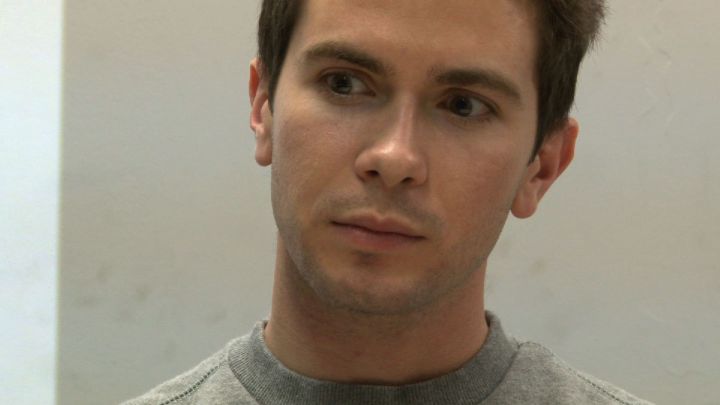Replicant VS Separatist Rehearsal 2
Last night we rehearsed for the first time with Paul Heyer, a painter from New York, in the role of Taliban. He’s a natural.
8. SCENE: FLASHBACK – INTERROGATION ROOM
HOLOSCREEN
The death of an Australian boy-bander: Bammer Ramsey, 33, he was in his home, he was on the couch. His body was found, on the couch, by a houseguest who is described in the press as an “immigrant night clubber” named Taliban.
REP-2
Tell us what you saw.
TALIBAN
I was in the bathroom with the tall guy and we left the short redhead was on the couch with his pants down but his underwear was still on last I saw. They had picked me up at a club by the beach and I could tell from their watches that they had money and they were babes, for the most part. The tall guy sucked on my dick for a while, to get it hard, and then he sent me, naked and only 25-years old, into the living room to see if the other guy wanted to join us, or if he was asleep, which he at first appeared to be, on the couch, staring at the sunrise. I touched his face with my penis. His cheek was cold.
REP-1
Stop lying. You killed him.
REP-2
You put a chemical agent on the tip of your dick. Admit it and we’ll cut a deal.
TALIBAN
That’s crazy. I tried to revive him but I couldn’t.
REP-1
Marks on the deceased’s chest back you up.
TALIBAN
The tall dude was all over me and he didn’t die. You should talk to him.
REP-2
Your alibi is missing.
TALIBAN
I went into the bathroom but the big guy was gone.
REP-1
Like he teleported or evaporated?
REP-2
You’re in a lot of trouble here, kid.
TALIBAN
Since when do you care about enemies of the state?
REP-1
So you knew who they were?
TALIBAN
I have good taste in music.
REP-1
Were you a member of the boy band too?
TALIBAN
I’m being framed.
REP-1
OK, Taliban. Enough games.
REP-2
I suppose you have a theory.
TALIBAN
He was at his beach view home, with the man he loved and someone cute they picked up. He was buzzing from a night of champagne and coke. He was tired; he had used all his energy on the dance floor. He sat there, anticipating the three-way that had been orchestrated by his naughty husband. He put his fingers between the elastic of his underwear and his stomach. He felt like he was drowning in tears of gratitude. Then he felt nothing.
REP-1
Nice story. Now tell us the truth.
TALIBAN
I want my lawyer.
REP-2
He lawyered up.
REP-1
Let him sit on ice for a while.
JAIL DOORS CLOSE ON TALIBAN.
REP-2
Coroner’s report in.
HOLOSCREEN 1
Cause of death: pulmonary oedema, i.e. natural causes. Hypothesis: he died of contentedness.
REP-2
Can you die from that?
REP-1
It’s a new weapon developed by the Governor’s secret police.
REP-2
Oh. Case closed.
BEEP BEEP BEEP.
Inspirational Critique
“Don’t tear me down. Why don’t you give me somethin’ helpful I can work with? Instead of talkin’ shit and making mean expressions,” he sings, accompanying himself on electric piano.
There’s been a lot of trash talking the Zeros. The Zeros! Some of us gave this decade the best years of our lives. Some of us were sexy during the Zeros, and had multiple partners at once; some of us fell in love, got married; some of us made beautiful music together; some had loving pets; some stopped watching TV; some of us cooked; some made art, and some of it was good; we all got older, and, if we managed not to die, wiser. So, wise up. Stop acting like we aren’t supposed to be dissatisfied. It’s not a burden to be critical of the circumstances of one’s existence: it’s awesome, and banal, and it’s the situation in which we find ourselves, together.
“Don’t tear me down, and I won’t make you feel bad to make myself feel good. I’ll give you somethin’ you can use to make improvements. Help me grow and I’ll return the favor. Face me critically but full of positivity.”
We return to the term ‘critique,’ because it can be inspirational. For those of us who attended and/or taught in art schools during this decade and/or others, there is ritual and revelation in the word. It describes a moment of reckoning! (“I have a critique today,” she said, breathlessly. She was defenseless, exhausted and hungry, when the group encircled her object, which inspired a stuttering cascade of concurrences and rejections.) In it’s active form, critique is the passing of judgment upon the quality of a work; in order to make this judgment, it is considerate to have a method for organizing one’s responses; and a theory to inform the method. There are those who survived art school and never want to hear the word again, but this reaction is based on a misunderstanding. ‘Crits’ (elides with the condition ‘critical’) can feel like a mortal wound, self-inflicted, accidental, or purposefully torn open by a sadistic classmate. Crits are never good; but a good critique could save the (art/life) world.
His voice is joined by harmonies: “If we’re open about it, when institutional thought is ruptured, an inspirational critique can result. A moment in which, for a second, all is questioned, allowing understanding of the situation that opens itself to new possibilities.”
We are embarrassed by the regime that occupied the US for eight years. We are embarrassed by the plutocracy that dominates the art world. As long as art is expensive stuff, this will continue, and though it’s not-new, critique is a means toward another order of things. One may worry the boards of museums have hijacked these places in order to improve the value of their own collections. Without commodification, we would escape the capitalist trap, but alternatives to commodities, such as performance art, can also be used to move merchandise. When performance artists become celebrities, they take on the aura of the commodity, and when celebrities become performance artists, the hegemony of the fame/wealth axis is entrenched. We imagine an exception: un-collectable art by no one in particular. Hence, a useful complication is collaboration: by undermining the authority of the signature/brand, we forge a collective identity that cannot be collected. Collaboration must be critiqued too: museums increasingly support collaborative projects and so are imbricated within these artistic productions. Everyone is implicated: artists become collaborators in an uncomfortable sense: they are working for a regime. Many artists who mobilize critique toward liberation fashion themselves the resistance, yet our circumstances are such that artists must collaborate with the establishment in order to be seen/heard. Political art, sold in galleries or exhibited in biennials, is not a popular front. It is a luxury good. Thanks to the critical space art objects must occupy to enjoy their status, critique is a roommate of paintings. The self-inflicted mandate of the institution to critique itself allows money for projects that address this complex. Money seemed to die this year, yet artists haven’t disappeared, and neither have rich people. We have a live/work space that can accommodate both, but the lease must be re-negotiated regularly. The privileged are often the audience for the demands made by artists, and though we may participate in protest, we find ourselves saving up for cute outfits to wear to parties where the deciders promise a temporary piece of consecrated real estate, a wall upon which to hang a note with the cleverly hidden message: “End the War, Help the Poor.”
All together now: “La la la la La la la la la la la la la la la la la la la La la la la la la la la la la la La la la la la la la la la la la la la.”
The inspirational is an embarrassment that shocks the affected into the productive aspiration to modify behavior. Inspiration suggests our own condition is conditional. Critique is motivated by and towards inspiration. Inspirational critique flourished in the Zeroes (thanks, in part, to the clarity of opposition to it), and will continue into the Teens, hopefully. The most inspirational aspiration is the conditional phrase, “I could love you,” which, when sung aloud, becomes a refrain worth repeating.








leave a comment